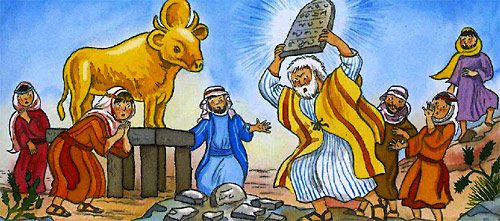I noticed a problem in the Bible that I’d never noticed before in church last week. The sermon was about the story of the golden calf, which as everyone knows is the incredibly egregious sin the Israelites committed against God after he brought them out of Egypt. Because God told them in the second commandment that they were forbidden from worshiping any graven images of the divine. The Ten Commandments happen in Exodus 20. The golden calf happens in Exodus 32. Therefore the golden calf was a sin because it violated the commandment given in Exodus 20. Except that the Israelites hadn’t received this commandment.
Moses was still on the mountain with God when the golden calf happened. The reason it happened was because he hadn’t come back and the Israelites were getting worried. They said to Aaron, “We don’t know what happened to this Moses guy. How about you take charge since you’re the priest and give us a statue to represent the god who brought us out of Egypt?”
When Aaron made the golden calf, he declared a “festival to the Lord,” using the Hebrew YHWH, showing that what he understood himself to be doing was not creating a different god but creating a representation of the god who brought the Israelites out of Egypt. I think when we read the story without thinking about it, the sin of the Israelites seems obvious. God brought them out of Egypt and then they randomly started worshiping another god they invented themselves. But making a graven image (second commandment) is not the same thing as worshiping a different god (first commandment). God is saying in the second commandment you can’t represent me so don’t try. And the Israelites didn’t have the second commandment when they broke it.
The most problematic part of the golden calf story is what Moses does to “punish” the Israelites afterward.
7 Then he said to [the Levites], “This is what the Lord, the God of Israel, says: ‘Each man strap a sword to his side. Go back and forth through the camp from one end to the other, each killing his brother and friend and neighbor.’” 28 The Levites did as Moses commanded, and that day about three thousand of the people died. 29 Then Moses said, “You have been set apart to the Lord today, for you were against your own sons and brothers, and he has blessed you this day.”
So he commands the Levites to violate the sixth commandment he had received not to kill in order to punish the Israelites randomly and collectively for violating a second commandment they hadn’t received. The Levites committed what we would legitimately call today an act of terrorism and that was the basis for their consecration as a holy religious order. It’s hard to see any difference between the understanding of God illustrated in this story and the understanding of God that motivates modern Islamic terrorism. To what degree is the secularization of Western culture the check that holds us back from killing people for explicitly religious reasons today (though we have no problem doing so for secular militaristic reasons)?
So does the problematic nature of this story mean that all scripture is not God-breathed and useful for teaching, rebuking, correcting, and training in righteousness (2 Timothy 3:16)? By no means! Our preacher gave us a very relevant and important sermon about anxiety, since it was the anxiety of the Israelites that caused them to make an idol to worship God through. Every verse in scripture can be useful for teaching. But using scripture for teaching and training in righteousness is different than using it to explain God’s nature as part of an abstract, systematic argument.
All scripture can be used by God to teach us, but not every verse in scripture is equally valid in its depiction of God’s nature. That’s a nuance that we need to wrestle through honestly. We cannot pretend that Exodus 32’s depiction of God is entirely compatible with what Jesus reveals. Biblical inerrantists already do this in their interpretation of the Old Testament about every aspect of the God depicted there except for his wrath. When God changes his mind or repents from harming somebody, he only “appears” to do so because God’s eternal foreknowledge is a non-negotiable that trumps the plain meaning of the scriptural text.
Why would it not be okay for a biblical interpreter to do something analogous to those who play the “appearance” card regarding God’s foreknowledge when facing a story about God doing something cruel and unfair like punishing people for a command they hadn’t yet received from him? In any case, our approach to scripture should not be to acquire “facts” about God, but to listen for what God has to teach us. There is plenty of rich teaching that can come out of Exodus 32, but using the text to make abstract, decontextualized arguments about God’s nature is a misuse of it. Maybe the purpose of the problematic portrayals of God in the Bible is throw a wrench in all our attempts to explain God definitively.
Check out my book How Jesus Saves the World From Us!













